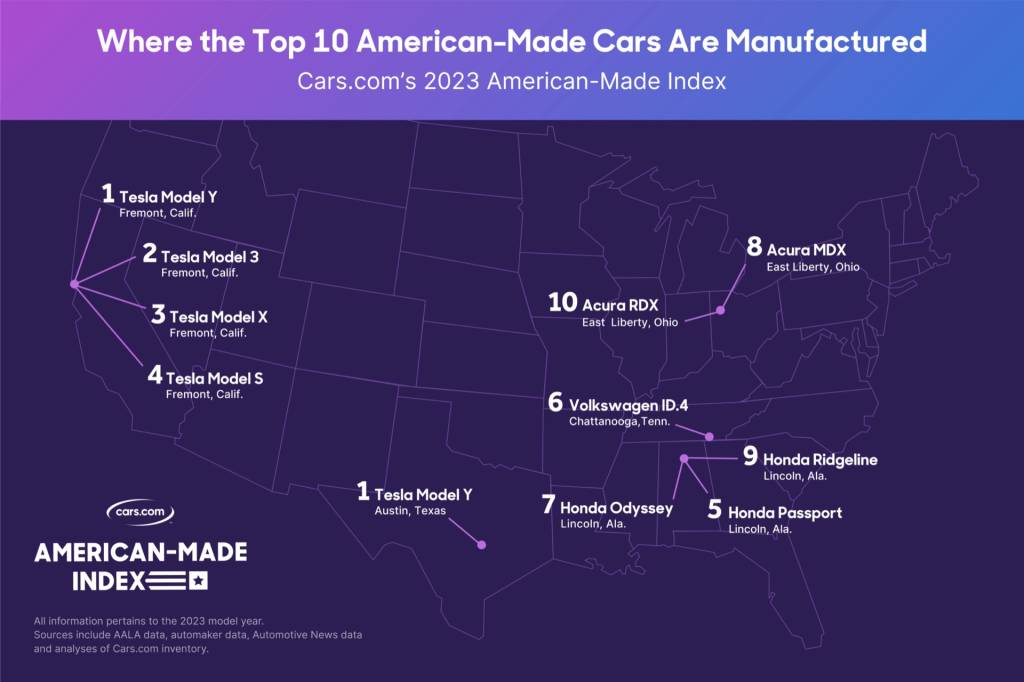Tesla can claim to be the most American-made automaker, based on the annual American-Made Index published by Cars.com on Wednesday. It’s the only automaker with 100% of its U.S. sales coming from domestic manufacturing, and its four models take the top four spots as the most American-made cars.
“Tesla debuted on the index just three years ago, but with headquarters and significant operations in the U.S., its rise shuffled the deck, displacing many traditional domestic manufacturers,” Jenni Newman, Cars.com editor-in-chief, said in a statement.
The bestselling Tesla Model Y electric crossover led the charge, followed by the Model 3 compact sedan, Model X three-row SUV, and Model S full-size sedan.
No vehicle produced by Detroit’s big three—GM, Ford, and Stellantis (formerly Fiat Chrysler Automobiles)—cracked the top 15. The Lincoln Corsair ranked 16th thanks in part to its production in Louisville, Kentucky, while the Chevrolet Corvette made in Bowling Green hit 19. The Dodge Durango was the highest ranked vehicle for Stellantis and also for manufacturing in Detroit at 21.
With production shifted from Germany to Chattanooga, Tenn., the Volkswagen ID.4 took the sixth spot as the most American-made vehicle. The rest of the top 10 consisted of Honda and Acura models.
2023 American-Made Index top 10, according to Cars.com
Electrified vehicles, including hybrids, plug-in hybrids, and battery electric vehicles, accounted for 22% of vehicles that made the index. The index is capped at 100 vehicles of the 388 models that could be considered.
Headquartered in California, and with factories in Fremont, Calif., and Austin, Texas, Tesla most met the five-point criteria of the index.
The index methodology largely follows the American Automobile Labeling Act (AALA) for parts sourcing shown on the Monroney stickers of new passenger vehicles: country of origin of transmissions; country of origin for engines; U.S. manufacturing workforce; location of final assembly; percentage of U.S. and Canadian parts. The in-depth analysis was limited to the 212,000 vehicles in the online car shopping site’s inventory, as well as from 437 in-person dealer audits across the country.

2023 American-Made Index top 10, according to Cars.com
As for electric vehicles, the methodology considered final assembly of battery packs, but not where the cells were sourced from.
Other parameters to the study were that vehicles can’t be too heavy, nor can its sales volume be too low. Newman wouldn’t disclose the level of those thresholds.
Other electric vehicle automakers headquartered in the U.S. and with domestic production didn’t qualify. The Lucid Air didn’t qualify due to low sales volume, and Rivian’s two models didn’t qualify due to their weight. Presumably, the exclusion follows the AALA, which does not apply to passenger vehicles with a gross vehicle weight rating (GVWR) of more than 8,500 pounds. The Rivian R1T pickup truck and Rivian R1S three-row SUV have a GVWR of 8,532 pounds.
The methodology does not assess sales volume of each model for a total economic effect, instead serving as a guide to consumers as to how much their considered purchase may contribute to the domestic economy. In a complementary survey of 1,013 in-market shoppers, 48% said they were willing to pay more for a new car if it contributed to or creates more U.S. jobs.
Last updated in 2020, the methodology did not consider the new rules and incentives of the Inflation Reduction Act finalized earlier this year. The IRA incentivizes North American assembly of vehicles and battery packs, and has requirements for battery sourcing to qualify vehicles for a $7,500 federal EV tax credit passed on to shoppers. It’s triggered a wave of planned domestic production, most notably VW announcing plans to have 80% of its 25 electric vehicles made in the U.S. by 2030.
